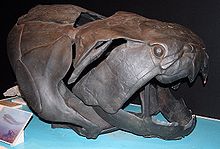Dunkleosteoidea
| Dunkleosteoidea | |
|---|---|

| |
| Dunkleosteus terrelli skull, Queensland Museum | |
| Scientific classification | |
| Domain: | Eukaryota |
| Kingdom: | Animalia |
| Phylum: | Chordata |
| Class: | †Placodermi |
| Order: | †Arthrodira |
| Suborder: | †Brachythoraci |
| Clade: | †Eubrachythoraci |
| Clade: | †Pachyosteomorphi |
| Superfamily: | †Dunkleosteoidea Vezina, 1990 |
| Contained taxa | |
Dunkleosteoidea is an extinct superfamily of arthrodire placoderms that lived during the Devonian period. The gigantic apex predator Dunkleosteus terrelli is the best known member of this group.
Phylogeny
Eubrachythoraci is divided into the clades Coccosteomorphi and Pachyosteomorphi, the latter of which can be further sub-divided into Aspinothoracidi and Dunkleosteoidea. Dunkleosteoidea was then considered to consist of the two sister families Dunkleosteidae and Panxiosteidae.[1][2]
However, the 2016 Zhu et al. phylogenetic study using a larger morphological dataset recovered Panxiosteidae well outside of Dunkleosteoidea, leaving the status of Dunkleosteidae as a clade grouping separate from Dunkleosteoidea in doubt, as shown in the cladogram below:[3]
| Eubrachythoraci |
| ||||||||||||||||||||||||
References
- ^ Carr, R.K.; Hlavin, W.J. (2010). "Two new species of Dunkleosteus Lehman, 1956, from the Ohio Shale Formation (USA, Famennian) and the Kettle Point Formation (Canada, Upper Devonian), and a cladistic analysis of the Eubrachythoraci (Placodermi, Arthrodira)". Zoological Journal of the Linnean Society. 159 (1): 195–222. doi:10.1111/j.1096-3642.2009.00578.x.
- ^ You-An Zhu; Min Zhu (2013). "A redescription of Kiangyousteus yohii (Arthrodira: Eubrachythoraci) from the Middle Devonian of China, with remarks on the systematics of the Eubrachythoraci". Zoological Journal of the Linnean Society. 169 (4): 798–819. doi:10.1111/zoj12089.
- ^ Zhu, You-An; Zhu, Min; Wang, Jun-Qing (1 April 2016). "Redescription of Yinostius major (Arthrodira: Heterostiidae) from the Lower Devonian of China, and the interrelationships of Brachythoraci". Zoological Journal of the Linnean Society. 176 (4): 806–834. doi:10.1111/zoj.12356. ISSN 0024-4082.








